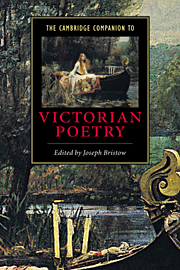Book contents
- Frontmatter
- 1 Reforming Victorian poetry: poetics after 1832
- 2 “The Lady of Shalott” and the critical fortunes of Victorian Poetry
- 3 Experimental form in Victorian poetry
- 4 The dramatic monologue
- 5 Victorian meters
- 6 Victorian poetry and historicism
- 7 Victorian poetry and science
- 8 Victorian poetry and religious diversity
- 9 The Victorian poetess
- 10 The poetry of Victorian masculinities
- 11 Aesthetic and Decadent poetry
- 12 Victorian poetry and patriotism
- 13 Voices of authority, voices of subversion: poetry in the late nineteenth century
- Glossary
- Guide to Further Reading
- Index
8 - Victorian poetry and religious diversity
Published online by Cambridge University Press: 28 May 2006
- Frontmatter
- 1 Reforming Victorian poetry: poetics after 1832
- 2 “The Lady of Shalott” and the critical fortunes of Victorian Poetry
- 3 Experimental form in Victorian poetry
- 4 The dramatic monologue
- 5 Victorian meters
- 6 Victorian poetry and historicism
- 7 Victorian poetry and science
- 8 Victorian poetry and religious diversity
- 9 The Victorian poetess
- 10 The poetry of Victorian masculinities
- 11 Aesthetic and Decadent poetry
- 12 Victorian poetry and patriotism
- 13 Voices of authority, voices of subversion: poetry in the late nineteenth century
- Glossary
- Guide to Further Reading
- Index
Summary
Among the Romans a poet was called votes, which is as much a diviner, foreseer or prophet . . . so heavenly a title did that excellent people bestow upon this heart-ravishing knowledge . . . And may not I presume a little further, to show the reasonableness of this word votes, and say that the holy David's Psalms are a divine poem? . . . Neither let it be deemed too saucy a comparison to balance the highest point of man's wit with the efficacy of nature; but rather give right honour to the heavenly Maker of that maker.
Sir Philip Sidney, The Defence of Poetry (1595)Vates means both Prophet and Poet; and indeed at all times, Prophet and Poet, well understood, have much kindred of meaning. Fundamentally indeed they are still the same; in this most important respect especially, that they have penetrated both of them into the sacred mystery of the Universe, what Goethe calls “the open secret!” . . . But now I say, whoever may forget this divine mystery, the Vates, whether Prophet or Poet, has penetrated into it; is a man sent hither to make it more impressively known to us.
Thomas Carlyle, “The Hero as Poet” (1841)- Type
- Chapter
- Information
- The Cambridge Companion to Victorian Poetry , pp. 159 - 179Publisher: Cambridge University PressPrint publication year: 2000
- 7
- Cited by

